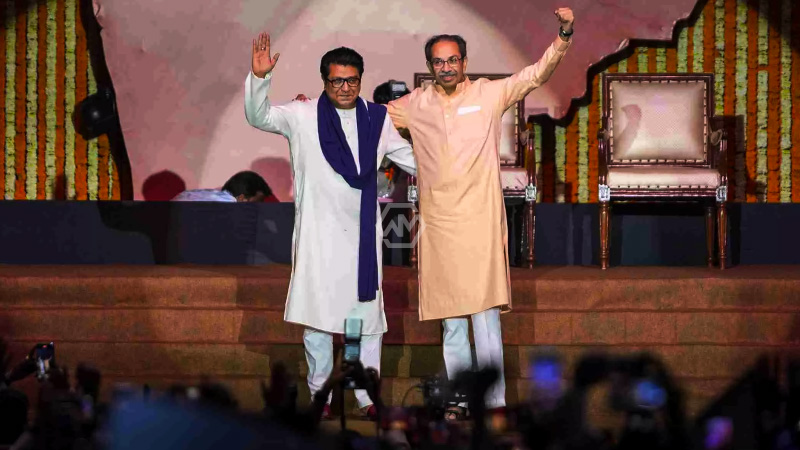- Uddhav and Raj Thackeray reunite after 20 years at a joint rally in Mumbai.
- Shiv Sena (UBT) and MNS oppose Hindi imposition, advocating for Marathi identity.
- Leaders accuse Centre of sidelining Maharashtra’s economic and cultural interests.
In a historic reunion after two decades, Shiv Sena (UBT) chief Uddhav Thackeray and MNS leader Raj Thackeray shared the stage at the ‘Aawaz Marathicha’ rally in Mumbai’s Worli, presenting a united front against the alleged imposition of Hindi in Maharashtra.
Beyond the language debate, the event served as a critique of the Centre’s economic decisions. Uddhav accused the government of systematically shifting key industries—such as the diamond business and major offices—from Mumbai to Gujarat.
Language of Unity: Thackeray Cousins Spark Political Shift in Maharashtra
The decision to host the rally at NSCI Dome instead of Shivaji Park was symbolic of a new beginning. Raj stated that while Shivaji Park holds emotional value, Worli represented a fresh platform to begin their joint political narrative. This strategic location shift indicates their intent to move forward beyond legacy and nostalgia.
This reunion, catalyzed by growing discontent over Hindi promotion and cultural sidelining, has the potential to realign Maharashtra’s political landscape. The visible camaraderie between Uddhav and Raj Thackeray not only energized supporters but also sent a message of regional solidarity, especially in the lead-up to elections.
Supporters welcomed the rare show of unity between the Thackeray cousins, which many viewed as a long-overdue gesture in the interest of Marathi pride. Political analysts suggest this could signal a consolidation of regional power and act as a counterweight to national parties perceived as ignoring local aspirations.
The event also marked a renewed focus on youth and language policy. Both leaders vowed to safeguard Marathi as the primary medium in schools and governance, asserting that no language should be imposed at the cost of another. This resonated strongly with young voters and cultural activists alike.
The Thackeray reunion is more than a family reconciliation—it’s a cultural reset for Maharashtra. As language, economy, and politics converge, their joint movement may redefine the regional discourse.
“A language is not just a medium of communication—it is the soul of a culture.”



